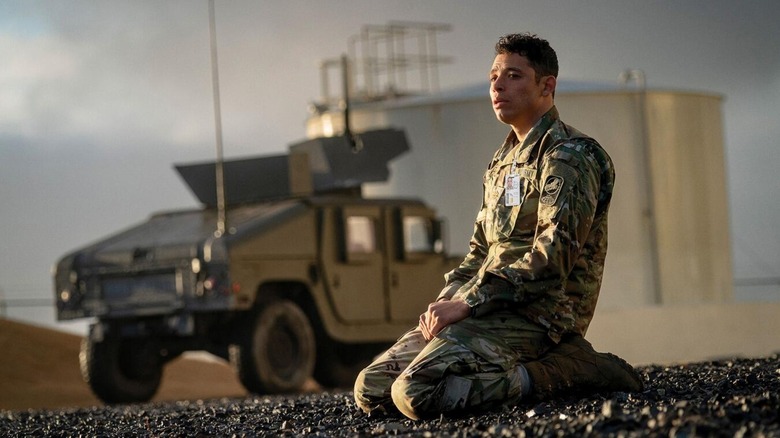House Of Dynamite's Ending Will Infuriate A Lot Of People – But It's The Best Possible Choice
Warning: this article will contain spoilers for "A House of Dynamite."
Kathryn Bigelow's new film "A House of Dynamite" is a terse tryptic of tense tales that all cover the same time frame. It takes place on the morning when an unknown foreign entity launches a nuclear missile from somewhere unknown. In the time it takes for the missile to sail toward the United States, audiences see the White House situation room, a distant army base, various politicians and experts, and the president himself responding to the crisis. The film's first 35 minutes or so sees what the emergency looks like at the White House, mostly seen through the eyes of senior staff member Olivia Walker (Rebecca Ferguson). Panic mounts as they realize that the nuclear missile is headed straight for Chicago, and it will be very, very difficult to shoot it down. The man in charge of the missile defense station in Alaska is Daniel Gonzalez (Anthony Ramos) who started the day stressed.
The second portion of the movie follows mostly and a high-ranking STRATCOM officer (Tracy Letts) and a low-ranking security officer (Gabriel Basso) as they think about the situation tactically. No one knows who launched the missile, nor whom to retaliate against. The third portion follows the President (Idris Elba), who is ill-prepared to make a life-or-death decision on the matter, as it could literally mean the fate of the world.
All three portions of the film, however, end a mere seconds before the missile strikes. Did the missile go off? What would the aftermath be? "A House of Dynamite" leaves the audience in a state of flux, free-floating within the unbroken tension. Bigelow deliberately doesn't let the story resolve. Some may find that aggravating, of course, but the unresolved ending reveals what "A House of Dynamite" is really about ... and it's very bleak: our processes, no matter how polished, cannot prevent the inevitable wholesale destruction of the world.
A House of Dynamite is a bleak film about our inability to handle the end of the world
It should be noted that "A House of Dynamite" suffers from bad release timing, having the film come across as somewhat dated. The cabinet of the current presidential administration has been stocked with pundits and podcasters who seem potentially unqualified. "A House of Dynamite," while a terse drama about the end of the world, may also serve as a comforting fantasy about a U.S. government that works the way it's supposed to. The film is full of intelligent, resolute, well-informed staffers who all want what's best for the world. It's an idealized version of a presidential administration, even if it's dealing with the End Times.
But, even if the people on screen are capable and intelligent, there is nothing they have in their mental arsenal to deal with inevitable world destruction. A missile is headed for Chicago. It's looking more and more likely that it will make its way past our defenses and land in a city of 2.7 million people. No one in the government can ascertain if the missile was Russian, Chinese, Korean, or some other nation.
The crux of "A House of Dynamite" is our powerlessness in the face of world destruction. For those who saw "Oppenheimer" in 2023, we know that humanity, through a lot of hard work, ingenuity, and tenacity, created a device that can swiftly and violently wipe out the population of the world. That film was set in the 1940s. Fast-forward 80 years, and we only have more of them. Various national powers own this technology. We don't attack each other merely because retaliation would end Earth. We are all, as the title says, living in houses of dynamite.
A House of Dynamite is about the horrors of nuclear war, not combat
These concepts are not new, of course. Children of the Cuban Missile Crisis likely recall the haze of nuclear death that hung over the nation. Likewise, kids raised in Ronald Reagan's America perhaps remember the weirdly pervasive nuclear fears that gripped the nation; it seemed almost inevitable that either the United States or Russia would nuke the other. One can see the fears lampooned in films like "RoboCop" wherein nuclear conflagration was reduced to a literal board game.
But "A House of Dynamite" is also not about specific world powers, nor their relationship to the U.S. The film doesn't end with a conclusive "villain," and we don't know how many people die (if any; it's floated that the bomb could be a dud). A death toll, however, would have felt crass in "A House of Dynamite." Also, putting blame on a specific world power would have infused Bigelow's film with an "Us vs. Them" mentality, reducing the film to partisan politics and an oversimplified Bad Guy narrative. If audiences had witnessed a full-blown counterstrike, then it would have just been a modern war film without nuance.
The lack of ending on "A House of Dynamite" was a savvy, intelligent choice. The expert Bigelow makes us, the audience, face the horror of the nuclear situation without giving us the comforting jingoism of rooting against a Bad Guy. Indeed, because an enemy power is not identified, the film's antagonist becomes nuclear weapons in general. The bad guy is the tense, deathful obsession the world has with amassing bombs, and the high tensions we maintain in keeping them trained on one another. One cannot fault the President for being indecisive during a crisis, as there are no correct decisions.
"A House of Dynamite" will open in select theaters on October 10, before streaming globally on Netflix on October 24, 2025.


